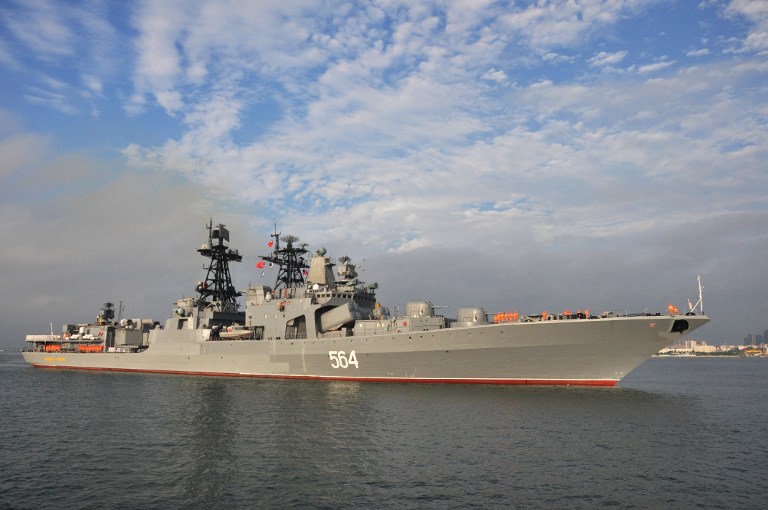
Russian navy ships arrived for eight-day joint military exercises with the Chinese navy in the South China Sea, in a show of force after an international tribunal invalidated the Asian giant’s extensive claims in the region. Philippine President Rodrigo Duterte said he is open to joint military exercises with China and Russia in an interview broadcast Monday (October 17, 2016) with Hong Kong based Phoenix Television./ AFP PHOTO / STR /
MANILA, Philippines | AFP | — Philippine President Rodrigo Duterte said he is open to joint military exercises with China and Russia, and reiterated he will no longer allow war games with the United States.
Duterte made the remarks in an interview broadcast Monday with Hong Kong-based Phoenix Television ahead of a four-day visit to Beijing, which begins on Tuesday and is aimed at improving ties that soured over competing claims in the resource-rich South China Sea.
Asked if he would consider joint military exercises with China or Russia, Duterte said: “Yes, I will. I have given enough time for the Americans to play with the Filipino soldiers.”
Duterte also repeated he would no longer allow joint exercises with the United States, the Philippines’ main defence ally and supplier of military hardware.
“This will be the last. It has been programmed. I do not want my soldiers to be humiliated,” Duterte said, in reference to one set of war games in the Philippines that ended last week.
Duterte has sought to dramatically reshape his nation’s foreign relations since taking office on June 30, by pivoting towards China and Russia while moving away from the United States.
He has been angered by US criticism of his war on crime, which has claimed more than 3,700 lives, and praised China and Russia for showing him “respect”.
But Duterte, signalling his shift is for pragmatic reasons, has also repeatedly ridiculed the United States for what he sees as its weakening economic and military influence around the world.
Duterte is bringing an entourage of hundreds of businessmen with him to Beijing, and Philippine media have said deals worth billions of dollars are expected to be announced during the trip.
Asked if he would seek to buy military equipment from China during his visit, Duterte told Phoenix Television: “Yes, but not really in (large) numbers.”
Duterte said he would also need small, fast attack boats from China to fight “terrorism”.
“If China does not help us in this endeavour, we will have a hard time fighting terrorism,” he said without elaborating.
Bilateral relations worsened under Duterte’s predecessor Benigno Aquino, who tried to challenge China’s expansionism in the South China Sea.
To counter China, Aquino allowed a much greater American military presence in the Philippines.
He also filed a legal case at a UN-backed tribunal, which ruled in July that China’s claims to most of the sea had no legal basis. China refused to accept the ruling.
Duterte has said he does not want to use the verdict to pressure China.
mm/kma/amj/sm
© 1994-2016 Agence France-Presse







